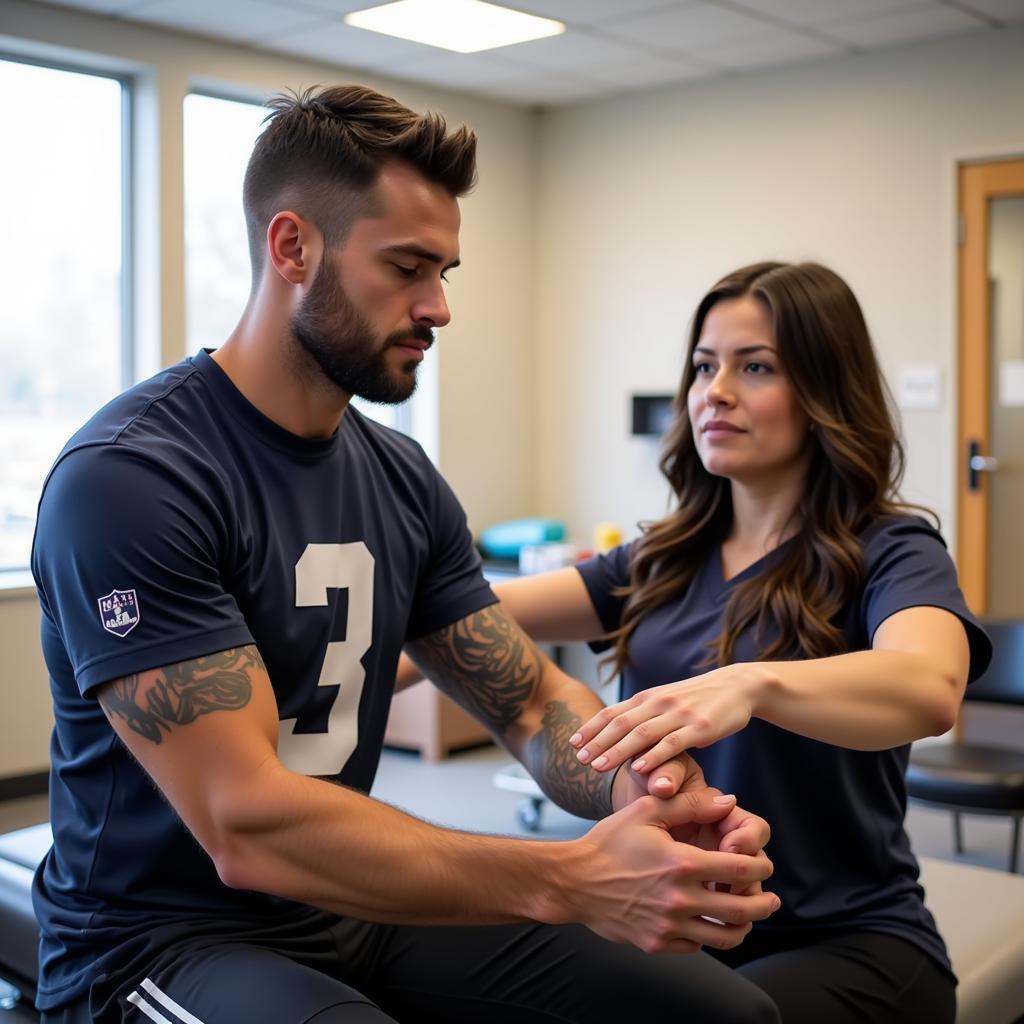The intersection of professional sports and life-altering medical procedures like a Football Player Liver Transplant brings a unique set of challenges and triumphs. This article delves into the complexities of such situations, exploring the medical aspects, the impact on a player’s career, and the inspiring stories of those who have faced this daunting challenge.
The Medical Reality of a Football Player Liver Transplant
Liver transplants are complex procedures, requiring extensive pre-operative evaluation and post-operative care. For a football player, the physical demands of the sport add another layer of complexity. The rigorous training, the potential for contact injuries, and the need for optimal physical condition present significant hurdles.
The recovery process is arduous, and the player must adhere to a strict medication regimen and lifestyle changes. Immunosuppressant drugs are essential to prevent organ rejection, but they can also have side effects that could impact athletic performance. Furthermore, returning to the high-impact environment of professional football necessitates careful monitoring and rehabilitation.
What are the criteria for a liver transplant?
The criteria for a liver transplant are complex and consider many factors, including the severity of liver disease, overall health, and the absence of contraindications.
What are the risks of a liver transplant for a football player?
The risks of a liver transplant for a football player include infection, rejection, and the side effects of immunosuppressant medications, which can impact athletic performance.
The Impact on a Football Career
A liver transplant can significantly impact a football player’s career. The time required for recovery, the potential for complications, and the uncertainty surrounding their ability to return to pre-transplant form can be emotionally and mentally challenging.  Football player undergoing rehabilitation after a liver transplant
Football player undergoing rehabilitation after a liver transplant
Furthermore, the player must consider the long-term effects of the transplant and the associated medications on their health and athletic capabilities. Returning to professional football requires immense dedication, perseverance, and the unwavering support of medical professionals, coaches, and teammates. football player dies liver disease illustrates the gravity of liver diseases.
How long does it take for a football player to recover from a liver transplant?
Recovery time varies, but it typically takes several months to a year for a football player to return to full activity after a liver transplant.
Can a football player return to professional play after a liver transplant?
Yes, it is possible for a football player to return to professional play after a liver transplant, but it is a challenging journey requiring dedication and careful management.
Inspiring Stories of Resilience
Despite the challenges, there are inspiring stories of football players who have undergone liver transplants and made successful comebacks. Their stories demonstrate the power of human resilience and the unwavering pursuit of their dreams. These individuals serve as beacons of hope for others facing similar battles, demonstrating that even in the face of adversity, it is possible to overcome obstacles and achieve remarkable feats.
Dr. Emily Carter, a leading transplant surgeon at the University of California, San Francisco, states: “Liver transplantation offers a second chance at life for many individuals, including athletes. While the journey is challenging, with the right medical care and unwavering determination, a return to high-level physical activity is possible.”
John Miller, a sports psychologist specializing in athlete rehabilitation, adds: “The mental and emotional fortitude required for a successful return to sport after a liver transplant cannot be overstated. A strong support system, coupled with a positive mindset, plays a crucial role in navigating this challenging journey.”
Conclusion
A football player liver transplant is a complex and challenging undertaking. The medical considerations, the impact on a player’s career, and the arduous recovery process demand immense resilience and determination. football player dies liver disease highlights the seriousness of liver disease. However, the inspiring stories of those who have triumphed over this adversity provide a testament to the human spirit and the enduring power of hope. The possibility of a return to the field, though demanding, exists, highlighting the intersection of medical advancements and athletic perseverance.
FAQ
- What is the success rate of liver transplants?
- What are the long-term effects of immunosuppressant drugs?
- How can I support a football player undergoing a liver transplant?
- Are there any support groups for transplant recipients and their families?
- What are the latest advancements in liver transplant surgery?
- What are the signs and symptoms of liver disease?
- How can I learn more about organ donation?
When you need support, contact Phone Number: 0869066600, Email: [email protected] Or visit the address: 491 An Duong Vuong Street, Ward, Binh Tan District, Ho Chi Minh City 71907, Vietnam. We have a 24/7 customer support team.